The Bach-Werke-Verzeichnis is a catalogue of compositions by Johann Sebastian Bach. It was first published in 1950, edited by Wolfgang Schmieder. The catalogue's second edition appeared in 1990. An abbreviated version of that second edition, known as BWV2a, was published in 1998.
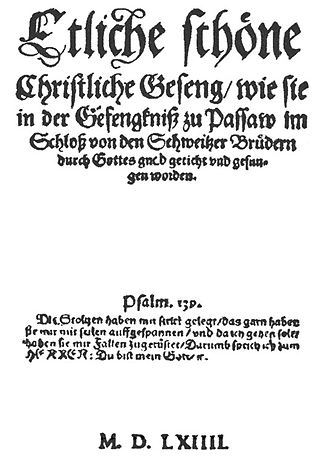
The Ausbund is the oldest Anabaptist hymnal and one of the oldest Christian song books in continuous use. It is used today by North American Amish congregations.

"Nun bitten wir den Heiligen Geist" is a German Christian hymn. The first stanza is a leise from the 13th century which alludes to the Latin sequence Veni Sancte Spiritus for Pentecost. It was widely known, and aside from its Pentecostal origin was also used as a procession song and in sacred plays.

Karl Johann Philipp Spitta was a German Protestant religious poet.

"Vom Himmel hoch, da komm ich her" is a hymn text relating to the Nativity of Jesus, written by Martin Luther in 1534. The hymn is most often sung to the melody, Zahn No. 346, which first appeared in a 1539 songbook and was probably also composed by Luther. This classic Christmas carol remains popular and has inspired many choral and organ works by other composers.

"Nun freut euch, lieben Christen g'mein", or “Dear Christians, One and All, Rejoice” in English, is a Lutheran hymn, written in 1523 by Martin Luther. It is one of Luther's early hymns and considered by some as one of his finest. It was published as one of eight songs in 1524 in the first Lutheran hymnal, the Achtliederbuch. The Achtliederbuch contained four songs by Luther, three by Speratus, and one by Justus Jonas. It appeared also in 1524 in the Erfurt Enchiridion.

"Gott sei gelobet und gebenedeiet" is a Lutheran hymn of 1524 with words written by Martin Luther who used an older first stanza and melody. It is a song of thanks after communion. Luther's version in three stanzas was printed in the Erfurt Enchiridion of 1524 and in Johann Walter's choral hymnal Eyn geystlich Gesangk Buchleyn the same year. Today, the song appears in German hymnals, including both the Protestant Evangelisches Gesangbuch, and in a different version in the Catholic Gotteslob.
"Herzlich tut mich verlangen" is a German hymn, with lyrics written in 1599 by Christoph Knoll, with a melody adapted from a secular song by Hans Leo Hassler. It is a prayer for a blessed death, beginning "Herzlich tut mich verlangen nach einem sel'gen End". Its hymn tune, Zahn No. 5385a, was later also used for Paul Gerhardt's "Befiehl du deine Wege" and "O Haupt voll Blut und Wunden".
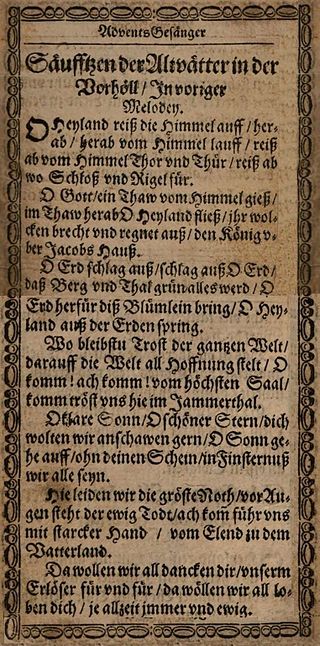
"O Heiland, reiß die Himmel auf" is a Christian Advent song. The text was first printed in 1622, attributed to Friedrich Spee; the melody was first printed in 1666.
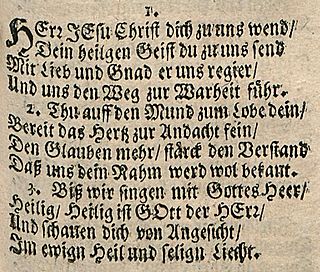
"Herr Jesu Christ, dich zu uns wend" is a Lutheran hymn from the 17th century. Its hymn tune, Zahn No. 624, was adopted in several compositions. It was translated into English and is part of modern hymnals, both Protestant and Catholic.
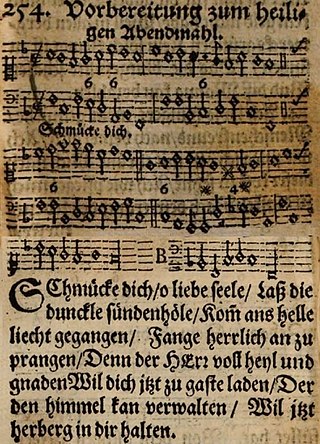
"Schmücke dich, o liebe Seele" is a Lutheran hymn in German, with lyrics by Johann Franck and a hymn tune by Johann Crüger. It was first published in Crüger's 1649 Geistliche Kirchen-Melodien, and was later adopted in other hymnals, such as the 1653 edition of his Praxis pietatis melica.

"Was mein Gott will, das g'scheh allzeit" is a Lutheran hymn in German. The text from c. 1550 is attributed to Albert, Duke of Prussia. The melody, Zahn No. 7568, goes back to a tune by Claudin de Sermisy, written in 1529 for a secular French song. The hymn has belonged to core Lutheran hymnody without interruption and is part of the Protestant hymnal Evangelisches Gesangbuch as EG 364.

Otto Riethmüller was a German Lutheran minister, writer, and hymnwriter. He was the president of Protestant youth organisations from 1928, published songbooks, and was a leading member of the Confessing Church. He designed the Protestant youth organization's logo, the Cross on the Globe, which is still used today.

"Macht hoch die Tür" is a popular German Advent hymn, written in 17th century Ducal Prussia. The lyrics were written by Georg Weissel in 1623 for the inauguration of the Altroßgärter Kirche in Königsberg. The melody that is now associated with the text appeared first in 1704 in the hymnal by Johann Anastasius Freylinghausen.
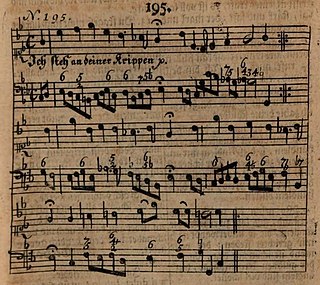
"Ich steh an deiner Krippen hier" is a German Christmas hymn, with lyrics by Paul Gerhardt which were first published in 1653. It was then sung with an older melody by Martin Luther, but a melody which was likely created by Johann Sebastian Bach for Schemellis Gesangbuch of 1736 is now part of current Protestant and Catholic hymnals.
"Auf, Christen, singt festliche Lieder" is a German Christmas carol. A first text was written in 1778 by August Erthel, which was first published in Fulda with a first melody that year. Heinrich Bone modified the text in 1851 for his hymnal Cantate!. It was sung with different melodies.

Cantate! (Sing!) is a German Catholic hymnal first published in 1847, and continued in seven editions until 1879. It was a collection of 444 old and new songs, edited by the educator and hymnwriter Heinrich Bone, and the first Catholic hymnal in German that was used in multiple dioceses. Several of the songs are still part of the common Catholic hymnal in the Germanosphere, Gotteslob.
"Freuet euch der schönen Erde" is a Lutheran hymn in German with a text by Philipp Spitta in 1827. In the hymnal Evangelisches Gesangbuch, it appears as EG 510, with a 1928 melody by Frieda Fronmüller.
"Lob Gott getrost mit Singen" is a Lutheran hymn in German, a paraphrase of the Latin Te Deum, by the Bohemian Brethren. The hymn is part of the current Protestant hymnal. The hymn was translated into English as "Praise God, praise God with singing". The hymn tune was used for several hymns in different languages, denominations and centuries.
"Wir weihn der Erde Gaben" is a Christian offertory hymn with text by Petronia Steiner to the melody of the 1529 "Lob Gott getrost mit Singen". It appeared in the first edition of the Catholic hymnal Gotteslob and is part of its second edition. Several composers wrote settings for use in church.














